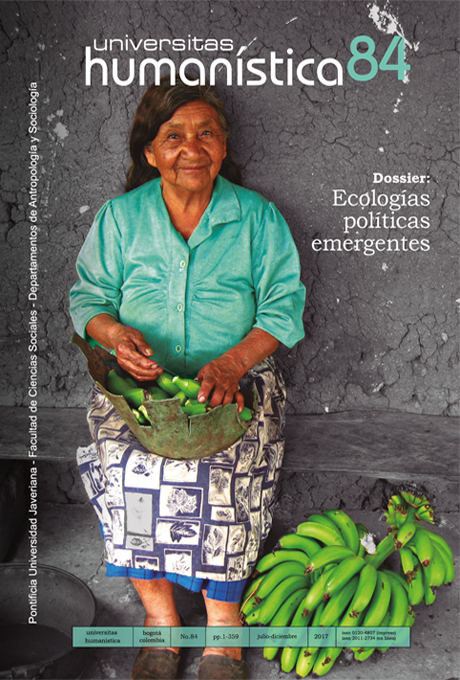Resumen
En los últimos años, los páramos han adquirido protagonismo en el escenario público colombiano como territorios disputados entre diferentes intereses, visiblemente entre aquellos alineados en torno al cuidado del agua y los vinculados al extractivismo minero. A través de un estudio de caso en el páramo de Santurbán, una zona clave para la provisión de agua para más de un millón de habitantes urbanos y rurales de sus alrededores, que alberga importantes reservas de oro y actividad agrícola intensiva, este trabajo aporta a la comprensión de los páramos como territorios cuyas transformaciones resultan de complejas interacciones históricas e interescalares, visibles tanto en torno al extractivismo como al ambientalismo. Apoyándonos en una perspectiva relacional y en el concepto de fricción propuesto por Anna Tsing, pretendemos aportar a la comprensión de esta complejidad y llamar la atención sobre la necesidad de tener en cuenta la multiescalaridad en las políticas de Estado con objetivos conservacionistas.

La revista Universitas Humanística se encuentra registrada bajo la licencia Creative Commons Reconocimiento 4.0 Internacional. Por lo tanto, esta obra se puede reproducir, distribuir y comunicar públicamente en formato digital, siempre que se reconozca el nombre de los autores y a la Pontificia Universidad Javeriana. Se permite citar, adaptar, transformar, autoarchivar, republicar y crear a partir del material, para cualquier finalidad (incluso comercial), siempre que se reconozca adecuadamente la autoría, se proporcione un enlace a la obra original y se indique si se han realizado cambios. La Pontificia Universidad Javeriana no retiene los derechos sobre las obras publicadas y los contenidos son responsabilidad exclusiva de los autores, quienes conservan sus derechos morales, intelectuales, de privacidad y publicidad.
El aval sobre la intervención de la obra (revisión, corrección de estilo, traducción, diagramación) y su posterior divulgación se otorga mediante una licencia de uso y no a través de una cesión de derechos, lo que representa que la revista y la Pontificia Universidad Javeriana se eximen de cualquier responsabilidad que se pueda derivar de una mala práctica ética por parte de los autores. En consecuencia de la protección brindada por la licencia de uso, la revista no se encuentra en la obligación de publicar retractaciones o modificar la información ya publicada, a no ser que la errata surja del proceso de gestión editorial. La publicación de contenidos en esta revista no representa regalías para los contribuyentes.


